Like a falling domino that triggers a chain reaction, a rare genetic condition called Alpha-1 was wreaking havoc on some of Don Elliott’s most vital organs.
The disease – which the 64-year-old grandfather of 18 had managed to keep under control, with medicine, for more than 20 years – caused severe cirrhosis, which was damaging to his liver, as well as a severe form of emphysema, caused by an inability to produce a vital protein called antitrypsin that serves to protect those organs. Ultimately, his damaged liver led to kidney failure that forced Don to undergo intermittent dialysis.
“I had asthma as a kid, and over the years ended up in a hospital with pneumonia and bronchitis more times than I can count,” recalls Don, who resides in Findlay, Ohio. “I’ve been sick for quite a while, but in September 2023 it got really bad.”
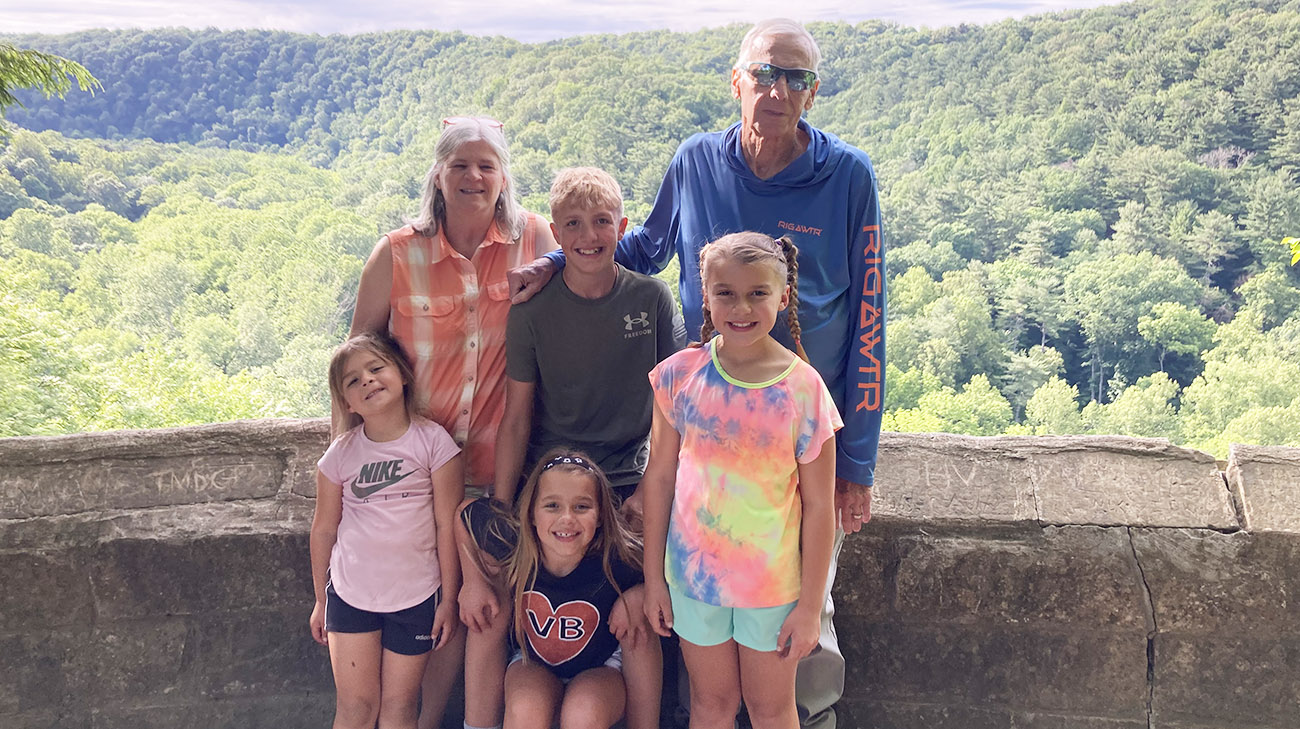
Don with his wife, Jill, and several of their grandkids. (Courtesy: Don Elliott)
So bad, in fact, Don came to Cleveland Clinic in a last-chance effort to save his life. A multidisciplinary team discussed a treatment plan that would ultimately lead to Don becoming the fourth person in the United States – and first in Ohio – to undergo a liver-lungs-kidney transplant with all organs coming from the same deceased donor. Don would be the first patient with Alpha-1 to undergo this type of triple-organ transplant.
Don discussed the triple-organ transplant in detail with his care team. “I said, yes, let’s do it. There was no other choice. I had run out of options, and I wanted to be here for my wife, kids and grandchildren. I knew I had to do this.”
According to Kenneth McCurry, MD, Program and Surgical Director of Lung and Heart/Lung Transplantation at Cleveland Clinic, and the cardiothoracic surgeon who led the lung transplant portion of Don’s operation, Don may not have survived longer than one year had he not undergone the multi-organ transplant.
“Multiple organ transplantation requires multidisciplinary expertise, and we’re fortunate to have skilled lung, liver and kidney programs with specialists who are adept in treating complex patients such as Don,” states Dr. McCurry. “We felt confident we could perform all three procedures successfully based on the skills of the various teams. And we felt comfortable we could take care of Don afterwards.”
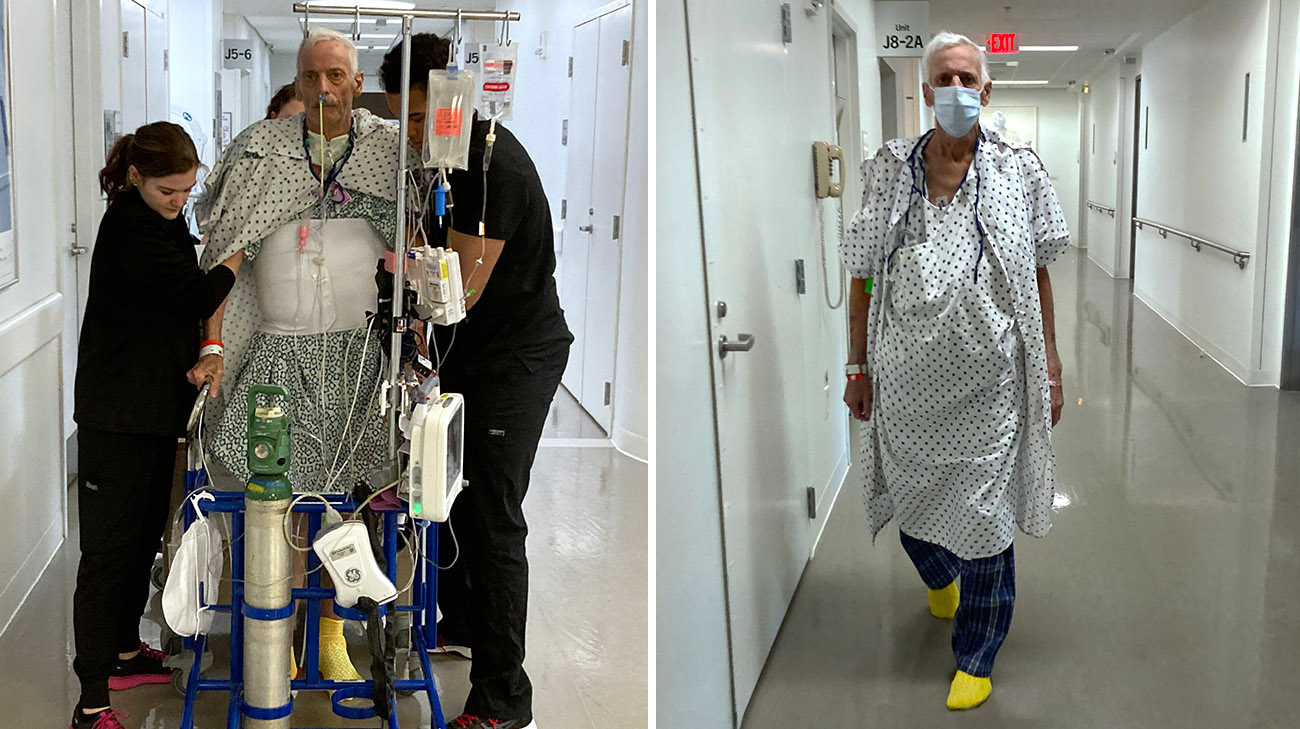
Don before transplant at Cleveland Clinic (left) and after transplant (right). (Courtesy: Don Elliott)
To avoid diseased organs failing from the stress of a single organ transplant, all dual lung-liver transplantations at Cleveland Clinic require the organs to come from the same donor. While Don’s surgical teams would have been willing to use a kidney from an additional donor – months after his initial surgeries – they were fortunate Don’s donor also had a suitable kidney available.
On February 14, 2024, about two months after Don was listed on the transplant waiting list, he learned there was a match for him to receive all organs from a single deceased donor.
The lung transplantation surgical team, led by Dr. McCurry, began the surgery slightly before 5 p.m. on February 15, 2024. While surgeons were transplanting two lungs into Don’s chest, the donated liver was kept viable using an ex vivo organ perfusion device that maintained the proper temperature and oxygenation needed.
Once the lung transplantation concluded, the liver team, led by program director and surgical director Koji Hashimoto, MD, PhD, began their portion of the procedure, finishing at about 5 a.m. the next day. Then, to ensure Don’s body was tolerating the impact of the first two surgeries (and because a kidney is generally able to tolerate being outside the body for longer periods than other organs), he was monitored in the intensive care unit for eight hours.
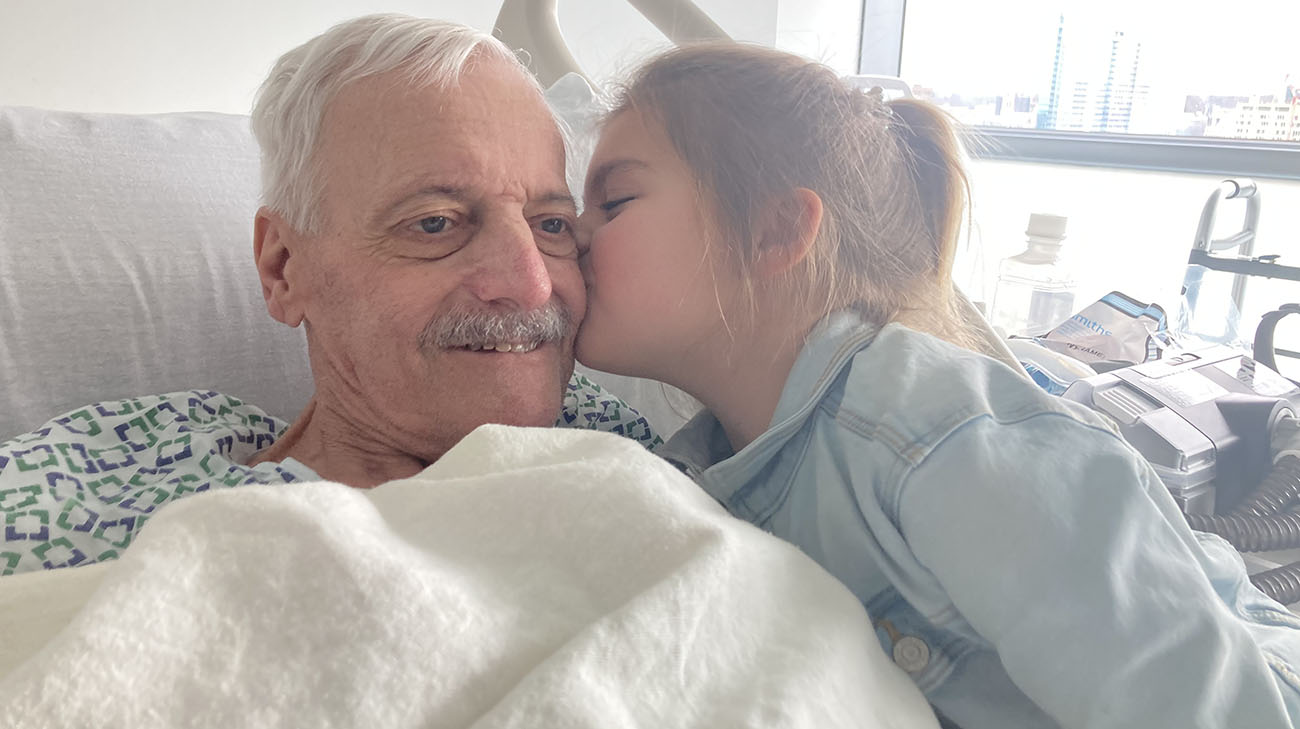
Don received a visit from his granddaughter after undergoing a triple-organ transplant. (Courtesy: Don Elliott)
Once he was stable, the kidney transplantation team, led by urologist and kidney transplant surgeon Venkatesh Krishnamurthi, MD, undertook the final segment of Don’s multi-organ transplant, finishing about 24 hours after the first part of the operation began.
While the transplants were successful, Don endured a lengthy recovery, spending about six weeks in the hospital, with the first week on life support. As Don recalls, “At first, it was rough. I don’t even remember the first month after the transplants. My wife, Jill, was by my bedside every day. I couldn’t have done this without Jill and the entire Cleveland Clinic team.”
Don’s postoperative team also performed a temporary tracheostomy one week after the transplant, moving the breathing tube from his mouth to his throat to aid in the lungs’ recovery. Soon after, Don was breathing on his own.
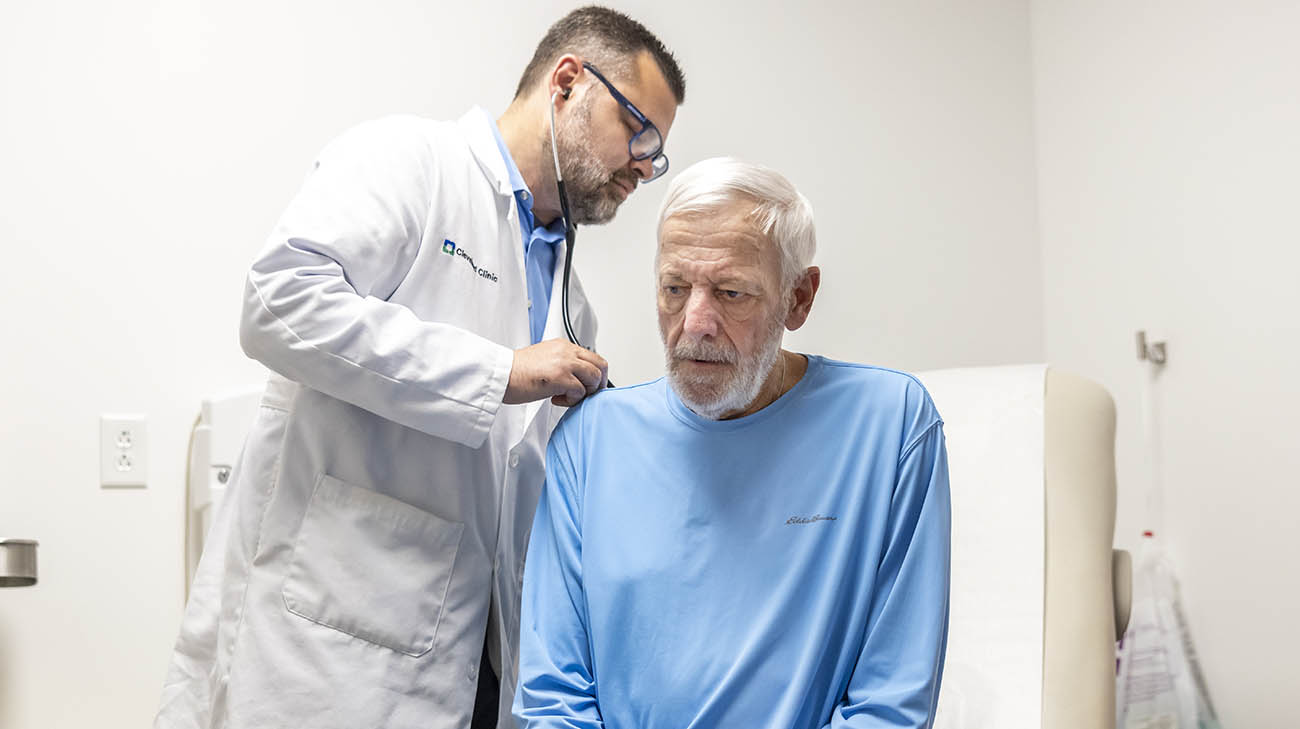
Don during a follow-up appointment with nephrologist Joshua Augustine, MD. Dr. Augustine is one of the doctors in Don's multidisciplinary care team. (Courtesy: Cleveland Clinic)
Explains Dr. McCurry, “Overall, Don did extremely well given the complexity and magnitude of these procedures. Throughout, his lung and liver function were good. His kidney function lagged for a period of time but ultimately recovered.”
In the months after his discharge, Don has been monitored closely by several specialists, including pulmonologist Sameep Sehgal, MD, and the medical kidney transplant team. Don’s progress, as Dr. Sehgal notes, has been remarkable.
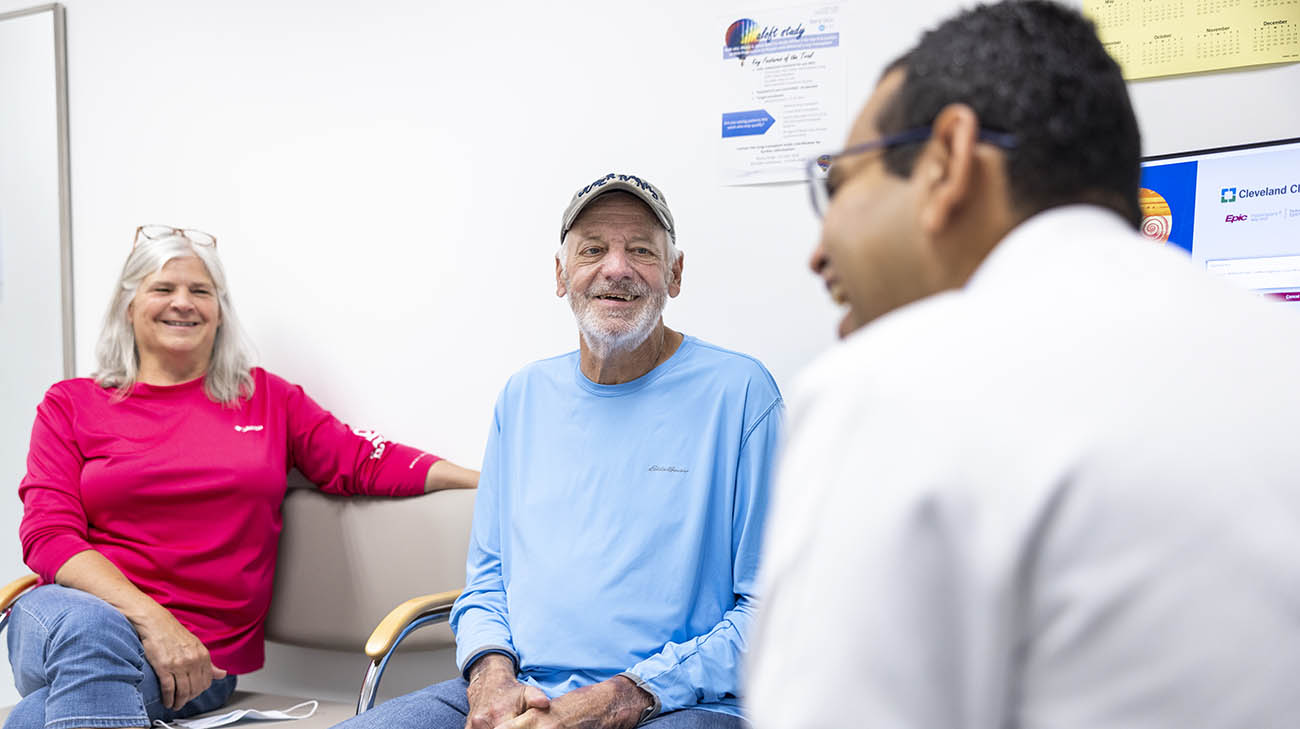
Don at a follow-up appointment with Dr. Sehgal. (Courtesy: Cleveland Clinic)
“All of his transplanted organs are working really well,” adds Dr. Sehgal. “This is a lot to get through and he's getting stronger every day, trying to get back to as much of a regular life as possible. Don has really benefitted from the donor and their family’s generous decision to support organ donation.”
Six months after the surgeries, Don feels like a new person, even vacationing in Florida in July, where he enjoyed walking the beach while breathing on his own without supplemental oxygen, something he wasn't able to do prior to surgery. It's just amazing. “I can breathe easily, I can walk every day, and I'm chasing the grandkids around. I’m able to enjoy life, and I have my donor and their family to thank for this priceless gift and opportunity.”
Related Institutes: Digestive Disease & Surgery Institute , Respiratory Institute, Heart, Vascular & Thoracic Institute (Miller Family), Glickman Urological & Kidney Institute

